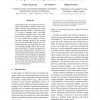2703 search results - page 115 / 541 » Learning operational requirements from goal models |
ICRA
2006
IEEE
14 years 2 months ago
2006
IEEE
— Many application tasks require the cooperation of two or more robots. Humans are good at cooperation in shared workspaces, because they anticipate and adapt to the intentions a...
ALT
1998
Springer
14 years 7 days ago
1998
Springer
Concept drift means that the concept about which data is obtained may shift from time to time, each time after some minimum permanence. Except for this minimum permanence, the con...
ACL
2011
12 years 11 months ago
2011
This paper presents a novel approach for leveraging automatically extracted textual knowledge to improve the performance of control applications such as games. Our ultimate goal i...
CVPR
2005
IEEE
14 years 10 months ago
2005
IEEE
We present a "parts and structure" model for object category recognition that can be learnt efficiently and in a semisupervised manner: the model is learnt from example ...
CAISE
2009
Springer
14 years 2 months ago
2009
Springer
MDD and MDA approaches require capturing the behavior of UML models in sufficient detail so that the models can be automatically implemented/executed in the production environment....

